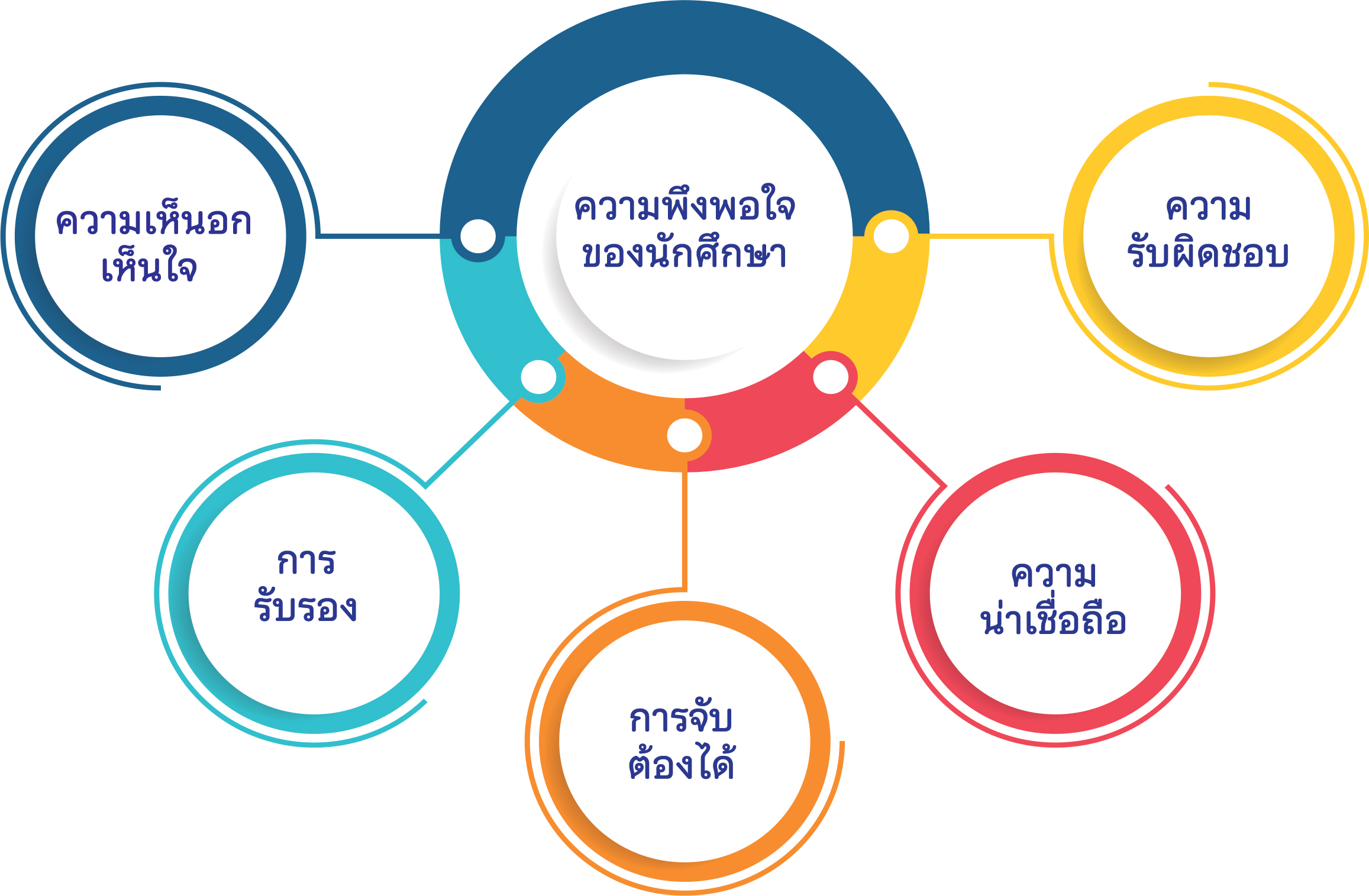Exploring Students’ Satisfaction on Educational Service Quality of Government and Private University in Thailand
Main Article Content
Abstract
This research article is to study the influence and prediction of educational service quality elements on students’ satisfaction. Students’ satisfaction currently is a major reason for improving the development approach of educational service quality of government and private university in Thailand. Consequently, the researcher used a questionnaire and collected 709 of the university students and analyzed the data by multi-regression analysis.
The research results revealed that: the elements of university service quality influenced and predicted significantly to students’ satisfaction. Moreover, the elements of service quality in terms of assurance, empathy, reliability, tangible and responsibility influenced significantly and simultaneously to students’ satisfaction at F = 122.07 (Sig. 000), R2 = .46 and accumulation error = 52%.
Article Details

This work is licensed under a Creative Commons Attribution-NonCommercial-NoDerivatives 4.0 International License.
เพื่อให้เป็นไปตามกฎหมายลิขสิทธิ์ ผู้นิพนธ์ทุกท่านต้องลงลายมือชื่อในแบบฟอร์มใบมอบลิขสิทธิ์บทความ ให้แก่วารสารฯ พร้อมกับบทความต้นฉบับที่ได้แก้ไขครั้งสุดท้าย นอกจากนี้ ผู้นิพนธ์ทุกท่านต้องยืนยันว่าบทความ ต้นฉบับที่ส่งมาตีพิมพ์นั้น ได้ส่งมาตีพิมพ์เฉพาะในวารสาร วิชาการธรรม ทรรศน์ เพียงแห่งเดียวเท่านั้น หากมีการใช้ ภาพหรือตารางของผู้นิพนธ์อื่นที่ปรากฏในสิ่งตีพิมพ์อื่นมาแล้ว ผู้นิพนธ์ต้องขออนุญาตเจ้าของลิขสิทธิ์ก่อน พร้อมทั้ง แสดงหนังสือที่ได้รับการยินยอมต่อบรรณาธิการ ก่อนที่บทความจะได้รับการตีพิมพ์References
ประสพชัย พสุนนท์. (2557). ความเชื่อมั่นของแบบสอบถามในงานวิจัยเชิงปริมาณ. วารสารปาริชาต มหาวิทยาลัยทักษิณ, 27(1), 144-163.
วีระศักดิ์ จินารัตน์. (2564a). ระเบียบวิธีวิจัยสมัยใหม่. อุบลราชธานี: ยงสวัสดิ์ อินเตอร์กรุ๊ป จำกัด.
_______. (2564b). มาตรฐานงานวิจัยเชิงปริมาณและการพัฒนา. อุบลราชธานี: ยงสวัสดิ์ อินเตอร์กรุ๊ป.
Ahmed, I., et al. (2010). Does service quality affect students' performance? Evidence from institutes of higher learning. African Journal of Business Management, 4(12), 2527-2533.
Alves, H., & Raposo, M. (2010). The influence of university image on students' behavior. International Journal of Educational Management, 24(1), 73-85.
Brown, R., & Mazzarol, T. (2009). The importance of institutional image to student satisfaction and loyalty within higher education. Higher Education, 58(1), 81-95.
Budiyanti, H., et al. (2019). Does Service Quality in Education and Training Process Matters? Study of Government's Human Resource Agencies in Indonesia. Journal on Efficiency and Responsibility in Education and Science, 13(1), 41-55.
Gruber, T., et al. (2010). Examining student satisfaction with higher education services using a new measurement tool. International Journal of Public Sector Management, 23(2), 105-123.
Hasan, H. F. A., et al. (2008). Service quality and student satisfaction: A case study at private higher education institutions. International Business Research, 1, 163-175.
Hwang, Y. S. & Choi, Y. K. (2019). Higher education service quality and student satisfaction, institutional image, and behavioral intention. Social Behavior and Personality, 47(2), e7622.
Jabbar, M. N., Hashmi, A. M. & Ashraf, M. (2019). Comparison between Public and Private Secondary Schools regarding Service Quality Management and its Effect on Students' Satisfaction in Pakistan. Bulletin of Education and Research, 41(2), 27-40.
Leonnard, L. (2018). The Performance of SERVQUAL to Measure Service Quality in Private University. Journal on Efficiency and Responsibility in Education and Science, 11(1), 16-21.
Oliveira, O. J., & Ferreira, E. C. (2009). Adaptation and application of the SERVQUAL scale in higher education. Proceedings of POMS 20th Annual Conference, 1-7 May, 2009, (page 1-20). USA: Orlando, Florida USA.
Parasuraman, A., Zeithaml, V. A., & Berry, L. L. (1988). SERVQUAL: A Multiple-Item Scale for Measuring Client Perceptions of Service Quality. Journal of Retailing, 64(1), 12-40.
Pedro, E., Mendes, L., & Lourenço, L. (2018). Perceived service quality and students' satisfaction in higher education: The influence of teaching methods. International Journal for Quality Research, 12, 165-192.
Sapri, M., Kaka, A., & Finch, E. (2009). Factors that influence student's level of satisfaction with regards to higher educational facilities services. Malaysian Journal of Real Estate, 4(1), 34-51.
Setya, O. F. (2015). The Influence of Rewards and Perceptions of Work on the Organizational Commitment of Public High School Teachers in North Jakarta. Jakarta: Education Management Study Program Postgraduate Program, Jakarta State University.
Sharif, K., & Kassim, N. M. (2012). Non-academic service quality: Comparative analysis of students and faculty as users. Journal of Marketing for Higher Education, 22, 35-54.
Silvestri, C., Aquilani, B. & Ruggieri, A. (2017). Service quality and customer satisfaction in thermal tourism. The TQM Journal, 29(1), 55-81.
Tian, R. G., & Wang, C. H. (2010). Cross-cultural customer satisfaction at a chinese restaurant: The implications to china food service marketing. International Journal of China Marketing, 1(1), 62-72.
Trihardini, I. M., Asrori, & Syukri, M. (2019). The Effect of Perception about the Educational Services Quality and Organizational Environment on Students' Achievement Motivation in Environmental Health Department. Journal of Education, Teaching and Learning, 4(1), 31-39.
Zeeshan, A. (2010). The Uses and Properties of Almond Oil. Complementary Therapies in Clinical Practice, 16, 10-12.

